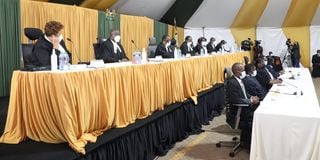Top global law experts seek to join BBI battle

A seven-judge bench of the appellate court ruled that the Constitution of Kenya Amendment Bill 2020 (BBI) is null and void and its processes were unlawful.
The legal battle over the Building Bridges Initiative (BBI) set for the Supreme Court has attracted top foreign constitutional law experts.
Professors Richard Albert (USA), Yaniv Roznai (Israel), Rosalind Dixon (Australia), David E. Landau (USA) and Gautam Bhatia (India) seek to participate in the case as friends of the court.
Although they claim to be impartial and have no personal or pecuniary interests in the matter or its outcome, they seem to be opposed to the Bill.
Prof Albert says the Bill is not properly understood as a constitutional amendment, but rather as “a constitutional dismemberment” due to the vast number of proposed alterations and the content of the changes.
“The Bill seeks to transform the Constitution of Kenya in a way that exceeds the boundaries of the existing constitution. The Bill is 45 pages in total, it contains 74 amendment articles, and it includes two Schedules appended to the main text,” he says.
If the BBI Bill is ultimately adopted, he argues, its dozens of amendment articles will affect almost the entirety of the Constitution, effectively leaving none of the existing laws unchanged either expressly or by implication. That is not the work of a constitutional amendment, he says.
Prof Albert and Prof Roznai intend to address the court on five questions each in relation to the constitutional amendment.
Prof Roznai says the basic structure doctrine is applicable in Kenya and indeed, in the Constitution, several topics may only be amended by the people and not Parliament.
This is contrary to the argument held by Attorney-General Kihara Kariuki, who wants the Supreme Court to declare that the Constitution does not have a basic structure.
Prof Dixon, Prof Landau and Prof Bhatia also intend to inform the court that the constitution has a basic structure.
“As in other countries around the world, the express limitations and procedures found in Arts 255-57 of the Kenyan Constitution are complements to a basic structure doctrine in Kenya, and in fact provide support for the existence of a basic structure doctrine,” they say.
They want to make joint submissions on six issues to assist the court in its role in the development of law.
On electoral boundary delimitations (proposal to create 70 new constituencies), the scholars suggest that the decisions of the High Court and the Court of Appeal were correct.
They held that the delimitation of boundaries and apportionment of the proposed constituencies was the role of the Independent Electoral and Boundaries Commission (IEBC).
“Comparative experience clearly shows that where electoral districts are drawn by political incumbents, or in a highly partisan manner, this threatens basic principles of electoral democracy by allowing those actors to create a “tilted” playing field that renders elections increasingly unfair,” states their brief.
In their applications filed yesterday, the scholars are seeking to be admitted so as to assist the court in determination of the questions raised in the dispute by the appellants.
The petitions of appeal were filed by the AG, IEBC and lawyers Omoke Morara and Charles Kanjama. The dispute moved to the Supreme Court after a seven-judge bench of the appellate court ruled that the Constitution of Kenya Amendment Bill 2020 (BBI) is null and void and its processes were unlawful.
While describing themselves as “world-renowned scholars, experts and specialists in the area of constitutional amendment”, the professors says they possess the requisite professional skills that can assist the court in determining the dispute.
The Supreme Court judges will convene on October 21 to give directions on the hearing of the appeals.





